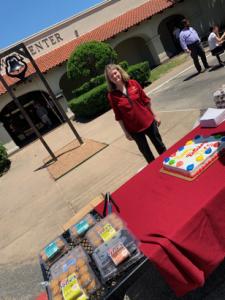 Hope works in our faculty nursery at the School and College. She has seen our own kids and many other children develop. I have gotten to be Dad and watch our children. I get to see what she sees as she teaches. A child is full of wonder and love inspired by beauty. Bring the big red fire truck into the nursery and little Bea will wish to ride wearing her pink tutu. She wants to learn about this awesome, metallic, nifty, beautiful thing. This child, like every human, explains her experiences, tries to put together what is happening, has an evolving view of the world. She becomes a baby Socrates questioning everything and full of wonder!
Hope works in our faculty nursery at the School and College. She has seen our own kids and many other children develop. I have gotten to be Dad and watch our children. I get to see what she sees as she teaches. A child is full of wonder and love inspired by beauty. Bring the big red fire truck into the nursery and little Bea will wish to ride wearing her pink tutu. She wants to learn about this awesome, metallic, nifty, beautiful thing. This child, like every human, explains her experiences, tries to put together what is happening, has an evolving view of the world. She becomes a baby Socrates questioning everything and full of wonder!
We make contact with the external world, say a dog, are taught a word for this strange creature (“Doggie!”) and begin to fit dogs into our worldview. We form other beliefs (some true, some false) based on those external events that are subjective. “Dogs are the best pets!” These subjective beliefs link to the external.
As we think about reality, we discover non-physical objects such as numbers. If Vulcans existed on some planet Vulcan, their math would be like our math. We are confident enough in the reality of (some) mathematical objects that when we send probes out to the heavens, we include images to provoke geometrical thinking. Any rational being will have discovered the same truths of geometry that we have.
We teach mathematics confident that for almost every child mathematical truths will manifest themselves! A child in school is given many popsicle sticks and plays with them. She quickly learns something different from “a lot” and “a few” popsicle sticks. She learns what one popsicle stick is as opposed to four. No teacher can show a student a visible “one,” but soon the idea is manifest and whether symbolized “1” or “one”
She plays games in class using dice. She rolls a die and counts the dots: one, two, three, four. One day, she no longer counts the dots. . .she sees four. Perhaps early on this is just recognizing the pattern, but soon you can hold up four fingers, give her four popsicle sticks, thrown down four coins, roll two die and get four between the two, and she will just know. She will have grasped the idea of four.
All of her ideas interconnect. Some are more important, central strands of her understanding of reality. Other beliefs are secondary, depending on more important ideas. Over a lifetime, this woman will end up with “spiderweb” of beliefs.
I open the door early in the morning and a spider has been busy weaving a web, but caught only dew. The drops make the web shine and so all the parts are visible. There are the strong strands that keep the web connected to the rest of the world, so it does not fly away with a breeze. There are central strands that give the web coherence, form, and allow for function. There are secondary strands that I can pluck away and little happens in the web. They perform a function, but they are not essential to the survival of the whole.
Natural sciences are one way we build connections to what is outside our own minds. Poetry, literature, theology and many other disciplines push us toward minds not our own and objective reality beyond our bodies. We develop strong anchors to what is objective or external to us. When we get one such strand wrong, then when we must begin again other strands. We are not “blown away,” because other ideas endure keeping us sane and connected to external reality. This is how we can afford to be skeptical about such ideas in the first place!
Logic, mathematics, philosophy, theology, and Divine Revelation are some ways we build up an internal structure to make sure we have a functioning web of beliefs. We can can afford to speculate, to develop concepts not as vital to the whole as others. These are intellectual speculations, ideas that whose plausibility depends on other beliefs. As a philosopher, I am convinced that God exists, then that the Christian revelation of God in Jesus is correct. These are central to my intellectual makeup. If both of these are true, then there are possibilities to consider, say a global flood in the days of Noah, that would not be worth considering otherwise.
We develop strong ideas not so we can stop speculating, but so we can open new, secondary, intellectual possibilities!
What about beauty? In the morning, when I look at the web, I see beauty. In the evening, when I look at the stars I see beauty. Beauty keeps me moving forward outside myself, because outside myself has so much more beauty. The beauty of the external world drives my soul to connect. The desire for beauty in my own soul demands harmonizing my ideas, creating a beautiful web of belief.












